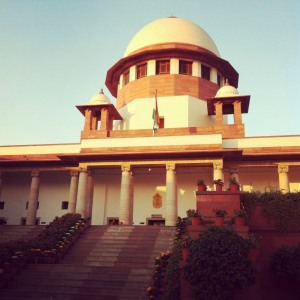Author: Nikhil Kanekal
India’s apex court is slated to decide key cases which, one way or another, will have a significant bearing on online free speech and regulation. The cases are in initial stages of hearing and will gain momentum once the court decides to hear them substantially, which, going by its procedure, will likely take some months.
Kamlesh Vaswani v. Union of India
Kamlesh Vaswani’s petition against pornography wants the court to direct the government to declare key sections of the IT Act ultra vires the constitution. He has asked for a national action plan against pornography and a separate law that will exhaustively curb ‘the growing problem of pornography’. He wants the government to insert new sections into the IT Act which will be more stringent and carry heavy penalties for creating, transmitting, storing and viewing pornography. He also asks that these be made non-bailable and cognizable offences.
The crux of the petition concerns the enforcement of an effective bar on access to pornographic content in India. This petition will need to be considered both from the perspective of the jurisprudence on obscenity and free speech, and from the perspective of how far it is possible to completely remove a category of speech/content from the Internet. There is a range of complications associated with trying to ban content online due to the structure of the Internet. The state and its instruments are not yet sophisticated enough to filter out the narrow range of content that is legitimately banned without including material outside the ambit of illegal content. Although most stakeholders agree that child pornography must be removed from the Internet – it continues to be difficult to enforce universally, owing to the nature of the Internet.
The Rajya Sabha committee has also issued a public call for inputs on this issue.
Shreya Singhal v. Union of India
Shreya Singhal’s case was admittedly shortly after the much publicised arrest of Shaheen Dhada in Mumbai. The Supreme Court has been asked to strike down Section 66A of the Information Technology Act, 2000. This law has been adopted from a similar provision in the United Kingdom’s Communication Act, 2003. However, the Queen’s Bench Division of the High Court has read down this provision in 2012, making the UK more tolerant of free speech online. Besides asking for Section 66A to be declared ultra vires the constitution, Singhal has requested the court to issue guidelines so that offences concerned with free speech and expression are treated as non-cognizable under criminal law, meaning that police powers are brought under safeguards on areas such as making arrests without a warrant as well as the power to investigate.
Mouthshut.com v. Union of India
The Mouthshut.com petition challenges the Information Technology (Intermediaries Guidelines) Rules, 2011 which effectively creates a notice and take down regime for third party/ user content that intermediaries host. Originally the IT Act was meant to create a safe harbour for intermediaries, to shield them from liability for third party content. This safe harbour is subject to the intermediaries meeting a ‘due diligence’ standard – the rules which were meant to explain what this standard meant, have instead created a whole liability system surrounding contexts in which intermediaries are given notice of objectionable content and do not take it down within the specified time (An academic paper on this aspect, authored by Pritika Rai Advani, is to be published soon). Although intermediaries are permitted in theory to judge content as unobjectionable, the fear of litigation has led to over compliance – this includes taking down legitimate content to avoid expensive and time-consuming law suits. The petition argues that as delegated legislation, the rules are not only unconstitutional but also go well beyond the scope permitted by the IT Act.
Dilipkumar Tulsidas Shah vs. Union of India
Dilipkumar’s petition asks the court to pass guidelines to ensure that police officials have a standard operating procedure to deal with complaints and reports related to Section 66A and other offences listed under the Information Technology Act. Several police actions under the IT Act thus far have been inconsistent and more abuses of power. A bench comprising justices H. L. Gokhale and Jasti Chelameshwar has decided to hear the Mouthshut.com case along with Shreya Singhal’s petition and Dilipkumar Tulsidas Shah’s petition.
Rajeev Chandrashekar v. Union of India
Chandrashekar wants the court to declare section 66A of the IT Act and sections 3(2), 3(3), 3(4) and 3(7) of the IT (Intermediaries Guidelines) Rules, 2011 ultra vires the constitution. This petition is also attached to Shreya Singhal’s case.
Note: Common Cause and People’s Union for Civil Liberties (PUCL) also plan to file petitions that challenge parts of the IT Act and IT rules, and these petitions are likely to be tagged with Shreya Singhal’s case. We will provide an update about these petitions shortly. Additionally, there are some cases pending before various High Courts concerning provisions of the IT Act and Rules.

Thanks for the interesting update! Another development you might like to follow: Facebook ‘likes’ are now protected by the US Constitution.
http://www.telegraph.co.uk/news/worldnews/northamerica/usa/10319611/Facebook-Likes-protected-by-US-Constitution.html
LikeLike
Pingback: Supreme Court adjourns IT Act cases for final hearing | Centre for Communication Governance
Pingback: Apex Court inquires whether Government of India departments can issue directions for blocking pornographic sites | Centre for Communication Governance
Flordemojito Carlos
LikeLike